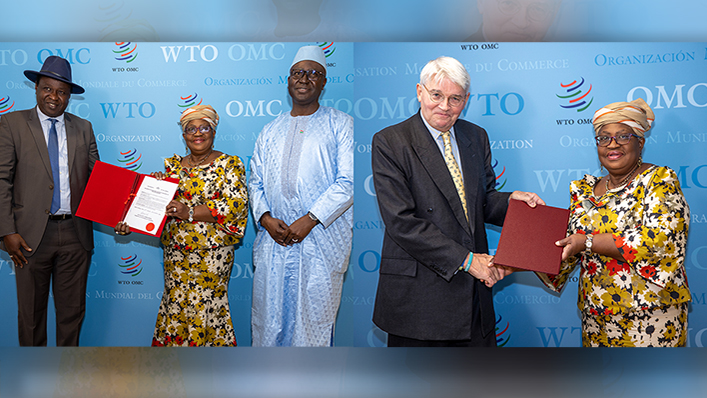
DG Okonjo-Iweala said: “I am delighted to receive the formal acceptance of the Agreement on Fisheries Subsidies by the Gambia, the first least-developed country to do so. I also heartily welcome the UK’s formal acceptance of the Agreement on Fisheries Subsidies, and am grateful for its pledge to the Fisheries Funding Mechanism.”
“The steady influx in formal acceptances of the Agreement on Fisheries Subsidies from governments across regions and levels of development is a testament to the widespread recognition of the pressing need to protect our oceans. Each new acceptance marks a step forward in our collective efforts to curb harmful fisheries subsidies, preserve marine resources, and safeguard the welfare of the people that depend on them,” DG Okonjo-Iweala said.
The most recent deposits of instruments of acceptance bring the total number of WTO members that have formally accepted the Agreement to 55. This is 50% of what is needed for the Agreement to come into effect (two-thirds of the WTO membership).
Baboucarr Ousmaila Joof, Minister of Trade, Industry, Regional Integration and Employment of the Gambia said: “It is with great commitment and responsibility that the Gambia joins the international community in accepting the WTO Agreement on Fisheries Subsidies. This agreement marks a crucial step towards sustainable marine practices and preserving our vital oceanic ecosystems. By addressing the challenges of illegal, unreported, and unregulated fishing and overfished stocks by eliminating harmful subsidies, we are protecting our marine resources and safeguarding our coastal communities’ livelihoods. As a coastal state, the Gambia recognizes the critical role of sustainable fisheries for our national economy and the well-being of future generations. Our participation in this agreement is a testament to our dedication to promoting sustainable trade practices and environmental stewardship, in line with our commitment to the Sustainable Development Goals.”
Minister Mitchell said: “I was delighted to present the Director-General with the UK’s instrument of ratification of the WTO fisheries agreement. It is a landmark agreement – vitally important for the world’s fish, for the fishing communities who depend on those fish, for the Sustainable Development Goals (SDGs), and for multilateralism. But the work isn’t finished. We strongly back the efforts to conclude the second stage of negotiations – to tackle the most harmful subsidies – ahead of the next WTO ministerial conference, MC13.”
“And I have been delighted to pledge up to one million pounds to the new WTO fisheries fund, through the Department for Environment, Food & Rural Affairs’ (DEFRA’s) Blue Planet Fund, to support the effective implementation of this agreement by developing nations,” he said.
The UK’s total contribution to the various WTO trust funds to date is CHF 13.54 million.
Adopted by consensus at the WTO’s 12th Ministerial Conference (MC12), held in Geneva on 12-17 June 2022, the Agreement on Fisheries Subsidies sets new, binding, multilateral rules to curb harmful subsidies, which are a key factor in the widespread depletion of the world’s fish stocks. In addition, the Agreement recognizes the needs of developing and least-developed countries and establishes a fund to provide technical assistance and capacity building to help them implement the obligations.
The Agreement prohibits support for illegal, unreported and unregulated (IUU) fishing, bans support for fishing overfished stocks and ends subsidies for fishing on the unregulated high seas.
Members also agreed at MC12 to continue negotiations on outstanding issues, with a view to making recommendations by MC13, to be held in February 2024 in Abu Dhabi, United Arab Emirates, for additional provisions that would further enhance the disciplines of the Agreement.
The full text of the Agreement can be accessed here. The list of members that have deposited their instruments of acceptance is available here. Information for members on how to accept the Protocol of Amendment is available here.
WTO Fisheries Funding Mechanism
Because the new Agreement on Fisheries Subsidies will involve adjustments and enhancements to WTO members’ legislative and administrative frameworks, transparency and notification requirements, and fisheries management policies and practices, Article 7 of the Agreement provides for the creation of a funding mechanism to provide targeted technical assistance and capacity building to help developing and least-developed country members with implementation.
The fund is operated by the WTO with partner organizations, namely the Food and Agriculture Organization (FAO) of the United Nations, the International Fund for Agricultural Development, and the World Bank Group, which bring to bear relevant expertise and allow the WTO to leverage its own expertise.
More information on the fund, which became operational on 8 November, is available here.
Share
Reach us to explore global export and import deals